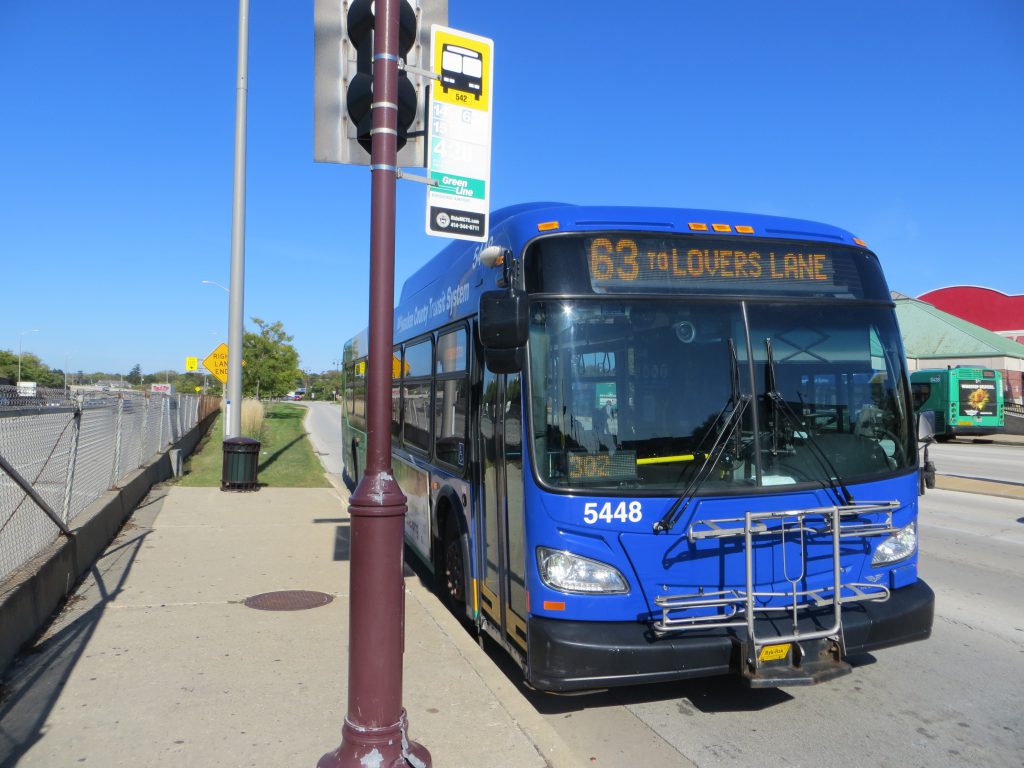COVID-19 At The Bargaining Table
Unions, employers discuss workplace changes in the age of pandemic.
The United Food & Commercial Workers (UFCW) Local 1473, represents about 5,000 grocery store employees and about 5,000 food processing workers in Wisconsin. At the union’s urging, some employers who have contracts with the union have agreed to $1 to $2 an hour in premium pay, although only temporarily, says UFCW service director Melanie Bartholf.
“Most of them will end in early April,” Bartholf tells the Wisconsin Examiner. “We hope to negotiate to continue those premiums. We are urging our employers to provide premium pay for the duration of the crisis.”
Other UFCW employers are giving one-time bonuses from $150 to $500, she adds. “The majority of our grocery employers have not agreed to any form of paid leave for associates impacted by COVID-19, and many are saying they will provide what the state or federal government requires of them, but otherwise will not change their leave policies.”
Meanwhile, the union has reached out to the Evers administration to designate grocery workers as “first responders,” similar to health care workers — something that the states of Minnesota, Michigan and Vermont have already done. The classification would give them access to free childcare during the health emergency.
Conflicts surface
CUNA Mutual, an insurance, financial services and technology firm based in Madison, has asked all employees who can do so to work from home while measures to curb the spread of the virus are in effect, including employees represented by Office and Professional Employees International Union (OPEIU) Local 39.
The union’s current contract with the company doesn’t expire until 2021, but the union approached management in March seeking a memorandum of understanding that would include additional sick leave related to COVID-19 illness.
After the company presented a draft and the union countered with its own language, which besides extending sick leave requested a no-layoff pledge, the company rejected the union’s draft, according to Local 39 President Kathryn Bartlett-Mulvihill. Union members responded with a petition urging CUNA Mutual management to reconsider.
CUNA Mutual spokesman Philip Tschudy confirmed ongoing talks with the union.
“We understand the COVID-19 virus poses significant risks and potential hardship to employees and their families,” he said, calling the company’s “top priorities” the health and safety of employees, partners and the community, along with continuing to serve customers.
“Unfortunately, at this time we have not yet been able to reach an agreement that allows the company to provide that additional leave,” Tsuchdy said. He declined comment on the petition except to say that the company had not seen it.
Both Tschudy and Bartlett-Mulvihill said the company and the union were continuing to discuss the matter.
In Milwaukee, bus drivers for the Milwaukee County Transit System (MCTS) have been seeking changes to working conditions that they feel are necessary to ensure safety from passengers who are sick.
James Macon, president of Amalgamated Transit Union (ATU) Local 998, says drivers aren’t satisfied that current shielding around the driver’s seat is adequate protection from a stray sneeze or cough.
Also to protect drivers from potentially infected riders, beginning Saturday, March 28, the transit system has suspended fare collection and told riders to board and leave the bus from the rear door. (An exception is made for riders with disabilities who need assistance in boarding.)
Macon said the union had been seeking the changes, but that they were too slow in coming.
Asked about Macon’s comments, an MCTS spokeswoman issued a statement that the bus system “is working hard to get riders to work, pharmacies, grocery shopping and doctor’s appointments during the pandemic,” and that it “has taken unprecedented steps to minimize the spread of COVID-19 among its customers and protect operators including extra daily cleaning, reduced service levels and most recently, rear door boarding and suspending fare collection.”
The statement concludes: “MCTS is asking the public to limit their trips to destinations that are absolutely essential, and to not ride the bus if they are experiencing coronavirus symptoms”
Better relations
In other industries, unions and employers have managed to work more amicably around the COVID-19 challenges.
Tom Niebuhr is a union representative for the Sheet Metal-Air-Rail-Transportation (SMART) union local 565 representing employees at about a dozen manufacturers in Madison, Wausau and surrounding areas. Union members build refrigerators and freezers, loudspeaker components, and a variety of other products.
As concerns rose about the new virus, Niebuhr and the other SMART union reps contacted those employers to address questions about job safety and sick days in a time of pandemic.
At many employers, employees who have paid sick leave also operate under attendance policies that penalize employees who miss work without giving advance notice, in order to discourage malingering. Workers who accumulate too many “occurrences” under such policies can face discipline, including being fired.
That concern is even greater because the continuing shortage of tests to confirm COVID-19 infection has led the state to reserve testing for only the sickest people. Yet even someone with mild symptoms, or none at all, can transmit the illness.
“The businesses that we work out of and represent have been very conscientious and they’ve worked with us,” Niebuhr tells the Wisconsin Examiner. “Two shops that I represent both have over 500 people on the floor. You bring [the virus] in there, and what happens if the entire work force were to become exposed? They recognize the potential behind that.”
He expects more discussions with employers going forward — for instance, on how to ensure social distancing on a large factory floor with hundreds of workers.
In the meantime, though, with a buildup of inventory and the economic slowdown triggered by the anti-virus measures, two appliance factories laid off workers represented by the union — some temporarily, and some indefinitely. Laid-off workers will be able to collect unemployment, but Niebuhr and his fellow union reps have been trying to connect those who want to keep working with other employers who have openings.
“We are just actively trying to support them to get them what they need,” Niebuhr says. “The day that the news hit about the layoffs, I got an email from a buddy of mine on the bargaining committee at GE Healthcare. He told me about the early contract extension and said, ‘Got layoffs? Send them our way.’”
Reprinted with permission of Wisconsin Examiner.
More about the Coronavirus Pandemic
- Governors Tony Evers, JB Pritzker, Tim Walz, and Gretchen Whitmer Issue a Joint Statement Concerning Reports that Donald Trump Gave Russian Dictator Putin American COVID-19 Supplies - Gov. Tony Evers - Oct 11th, 2024
- MHD Release: Milwaukee Health Department Launches COVID-19 Wastewater Testing Dashboard - City of Milwaukee Health Department - Jan 23rd, 2024
- Milwaukee County Announces New Policies Related to COVID-19 Pandemic - David Crowley - May 9th, 2023
- DHS Details End of Emergency COVID-19 Response - Wisconsin Department of Health Services - Apr 26th, 2023
- Milwaukee Health Department Announces Upcoming Changes to COVID-19 Services - City of Milwaukee Health Department - Mar 17th, 2023
- Fitzgerald Applauds Passage of COVID-19 Origin Act - U.S. Rep. Scott Fitzgerald - Mar 10th, 2023
- DHS Expands Free COVID-19 Testing Program - Wisconsin Department of Health Services - Feb 10th, 2023
- MKE County: COVID-19 Hospitalizations Rising - Graham Kilmer - Jan 16th, 2023
- Not Enough Getting Bivalent Booster Shots, State Health Officials Warn - Gaby Vinick - Dec 26th, 2022
- Nearly All Wisconsinites Age 6 Months and Older Now Eligible for Updated COVID-19 Vaccine - Wisconsin Department of Health Services - Dec 15th, 2022
Read more about Coronavirus Pandemic here




















